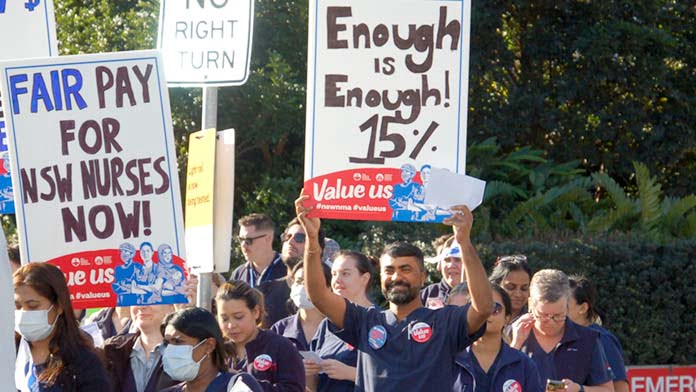The Minns government has shown no sign of backing down from their paltry pay offer of 10.5 per cent over three years for all nurses and midwives.
At the start of July, the government went on the attack, lodging an application in the Industrial Relations Commission. This indicates they are willing to end negotiations and use the commission to try to enforce their insulting pay offer.
There have now been six meetings between Association representatives and the government that have gone nowhere. With an IRC application lodged, the clock is ticking. We need the Association to call a major strike now, with adequate lead time so we can mobilise in big numbers.
Association organised campaign activity at the local level has been positive, including gathering pledges, wearing badges, a series of rallies and discussion of potential work bans. All of this activity must continue and grow.
But without a strike date to build towards it’s hard to build enthusiasm for this low-level activity. Pledge numbers are far below what we need and don’t accurately reflect the broad discontent across our profession. Our colleagues do want urgent change—we need to show them the Association has a fighting strategy to win it.
Mobilising for a strike will show the government we mean business but it will also help active nurses and midwives put the campaign on the map in our hospitals and start to involve our colleagues in a more serious way.
Our annual conference on 7 – 9 August is the perfect opportunity to prepare a major strike. If no date has been set by then, we need a resolution on the conference floor calling a date for action.
No alternative to strikes
Some members have expressed scepticism about industrial action, pointing to the failure of our strikes during the last campaign to seriously shift the government, and dwindling numbers for the later actions.
But the truth is that the last strike campaign was not consistently built and escalated to the action that could win. Because of that, later protest actions were smaller as the campaign lost momentum. We can’t let that happen this time. If we want to win a 15 per cent wage increase, a position that is miles from that of the Minns government, we have no alternative but to prepare for a campaign of far more serious and sustained industrial action than we have waged before.
The only thing that will force Minns to change his position is a serious political crisis around the issue of the disgraceful pay and conditions suffered by nurses and midwives. We need to create major disruption, forcing the issue onto the front pages of the papers and into conversations right across the community.
And we need a campaign that can bring that community with us, explaining the reality that the poverty wages we suffer are driving people away from nursing and midwifery, with disastrous consequences for our healthcare system.
The doctors’ union, ASMOF, are taking industrial action seriously—we could coordinate with them to build maximum pressure on the government.
We will need active solidarity and joint action with other public sector workers, too. This can start by formally inviting delegations from the Teachers Federation, firefighters’ union and others to our strike.
We need to set a date now for the first strike that will mark the beginning of this sustained campaign. There is simply no alternative to using our collective power en masse.
Rank-and-file initiative
Winning the Association to a position of fighting for a 15 per cent pay rise this year was a major achievement, driven by rank-and-file initiative.
Without nurses and midwives petitioning for a Special General Meeting, and turning out in numbers, our claim would be far weaker. We need to build on this initiative and leadership to develop the strike campaign.
Rank-and-file members should unite around the proposal for a strike date, win this in the Association and then campaign for mass meetings of workplace activists to plan how we can make the strike a success—and then escalate for more.
One serious problem with our last round of strikes was the lack of respect and understanding shown by Association officials to the leadership we need to develop among rank-and-file members to build the power needed to win.
Delegates and other workplace activists were not seriously involved in the development of a proper timetable for industrial action and broader discussions about strategy for the campaign.
Getting a text message announcing a strike with only a few weeks’ notice gives no time to properly prepare. The bigger strike rallies earlier in the campaign were fantastic but the people who attended were offered no clear next steps, just sent back to our hospitals to wait.
The campaign was also called off abruptly, with the leadership’s push to accept a measly 4 per cent pay rise leading to widespread demoralisation and confusion. We were promised ratios as a trade-off for lack of pay but even this has not happened.
This time, rank-and-file members need to be far more organised and vigilant.
In Victoria, it wasn’t until nurses held a major strike in May that the government shifted from its similarly disgraceful 3 per cent per year pay offer. And it was only after rank-and-file nurses voted overwhelmingly to reject the leadership’s insistence they accept a $6100 sign-on offer, and threatened further action, that they won 28.4 per cent over four years.
Minns won’t back down so easily, and NSW nurses and midwives need a far more substantial pay rise to reach parity with our colleagues interstate. But we need to start our strike campaign as soon as possible.






